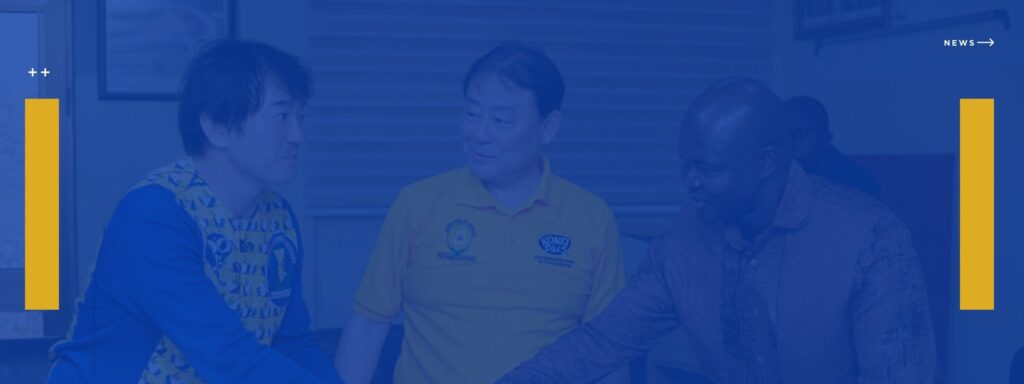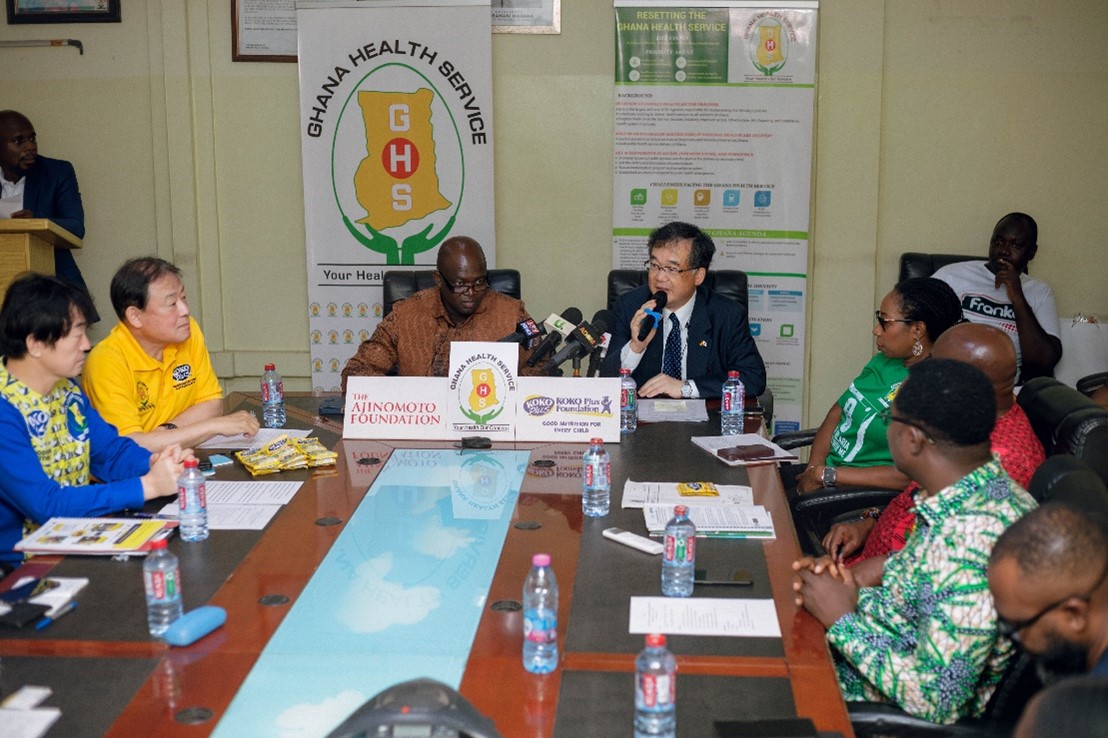


What is KOKO Plus®?
KOKO Plus Foundation
GHANA NUTRITION IMPROVEMENT PROJECT
KOKO Plus Foundation (KPF) is a Non-Governmental Organization established in Ghana in 2017, and appointed as an Official Partner by Ajinomoto Foundation (TAF) to manage “Ghana Nutrition Improvement Project (GNIP)” in Ghana. Through this project, we are contributing to a brighter future for children in Ghana.
OUR MISSION
Our mission is to realize maternal and child nutrition improvement and contribute to public welfare through research and development of the nutritional food product based on the understanding of local food culture, and sustainable manufacturing, distribution, and dissemination of nutrition knowledge.
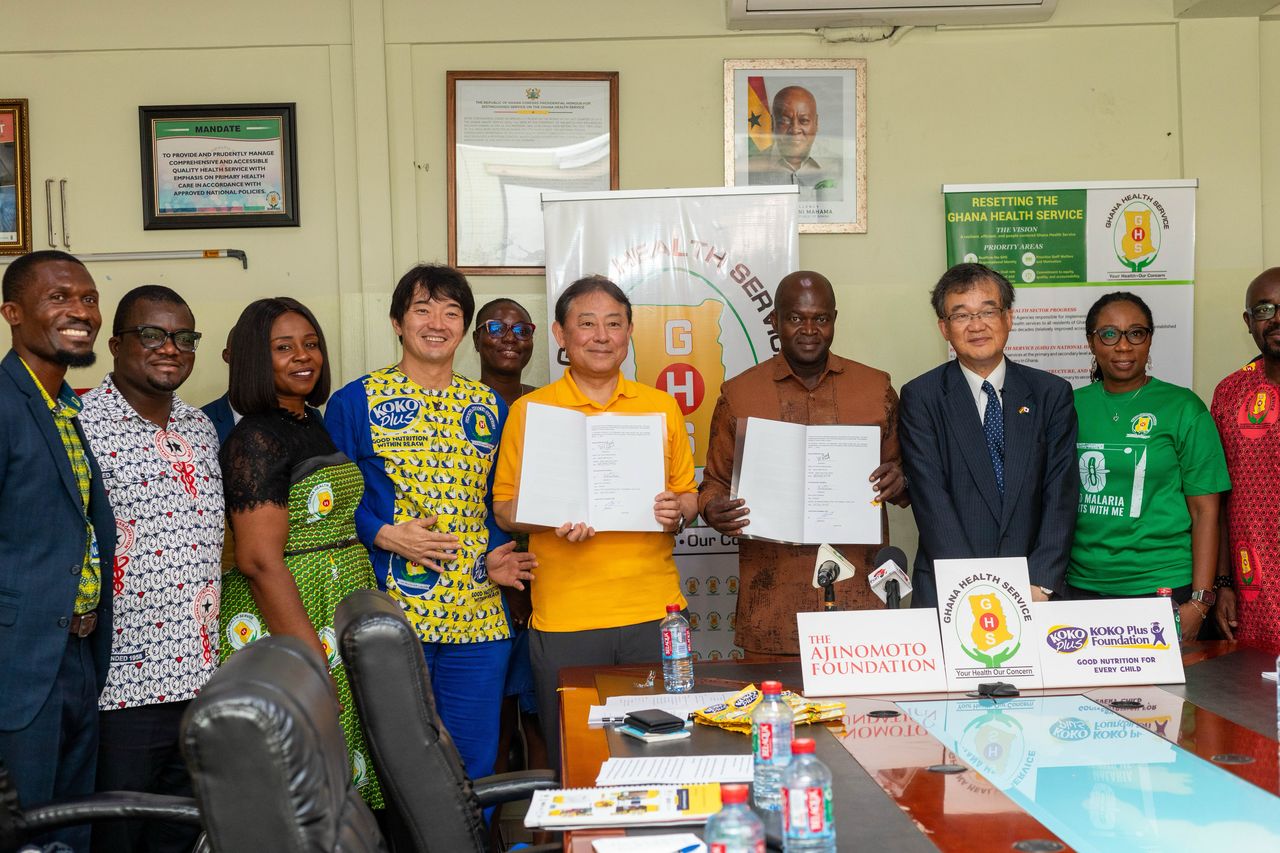
KOKO Plus Foundation, The Ajinomoto Foundation, and Ghana Health Service Sign New Memorandum of Cooperation to Combat Child Malnutrition through Innovative Public-Private Partnership
Read Full ArticleKOKO Plus Foundation
GHANA NUTRITION IMPROVEMENT PROJECT
KOKO Plus Foundation (KPF) is a Non-Governmental Organization established in Ghana in 2017, and appointed as an Official Partner by Ajinomoto Foundation (TAF) to manage “Ghana Nutrition Improvement Project (GNIP)” in Ghana. Through this project, we are contributing to a brighter future for children in Ghana.
OUR MISSION
Our mission is to realize maternal and child nutrition improvement and contribute to public welfare through research and development of the nutritional food product based on the understanding of local food culture, and sustainable manufacturing, distribution, and dissemination of nutrition knowledge.
Nutrition Education Videos Shorter Version
First, if you don't have time or a few bundles, watch it here!
Nutrition Education Songs
Kokoplus Song
Good Hygiene
4 Star Diet
Complimentary Feeding (English)
First 1000 Days
KOKO Plus song
Good Hygiene
Breastfeeding
4 Star Diet
Complementary Feeding
First 1000 Days
Kokoplus Song
GOOD HYGIENE
BREASTFEEDING
4 Star Diet
Complementary Feeding
First 1000 Days
Kokoplus Song
Complementary Feeding
First 1000 Days
4 Star Diet
Kokoplus Song
Good Hygiene
Breastfeeding
4 Star Diet
Complementary Feeding
Kokolus Song
Good Hygiene
Breastfeeding
4 Star Diet
Complementary Feeding
Good Hygiene
Breastfeeding
4 Star Diet
Complementary Feeding
Kokoplus Song
Good Hygiene
Breastfeeding
4 Star Diet
Complementary Feeding
Kokoplus Song
Good Hygiene
Breastfeeding
4-Star Diet
Complimentary Feeding
First 1000 Days
Kokoplus Song
Good Hygiene
Breastfeeding
4 Star Diet
Complementary Feeding
First 1000 Days
Kokoplus Song
Good Hygiene
Breastfeeding
4 Star Diet
Complementary Feeding
First 1000 Days
KOKO Plus Hero!
We will get a closer look at 3 children who ate KOKO Plus on a regular basis when they were young!
(Statements made in the program are those of individuals and do not represent the efficacy of KOKO Plus)
What is GNIP?
Background: Nutrition in the First 1000 Days
The First 1,000 days – the time between conception to 24 months of life – has been considered a critical phase in a child’s development. Scientific evidence suggests that this period records the most rapid body development. For example, the brain records its highest growth rate and plasticity during this period, with tremendous implications for overall well-being, cognitive development and behavioral expression in later life. Nutrition plays a central role in the health outcomes realized at this point in life and beyond. Accordingly, nutrition in the First 1000 days is considered a unique window of opportunity during which gains in general and cognitive development can be made, or irreversibly lost.
One of the critical irreversible adverse health effects of malnutrition in the First 1000 days is stunting. It is a condition in which a child experiences growth faltering, becoming too short for their age compared with WHO child growth standards, with corresponding lower cognitive development. Stunting stems from chronic or recurrent undernutrition, both of which, with concerted efforts, are preventable.
In Ghana, considerable government, private sector and development partners’ efforts have been centered on addressing stunting. Through these endeavours, stunting has declined from 33% in 1993 to 18% in 2022, according to the latest Ghana Demographic and Health Survey report. Though a commendable achievement, the number remains above the national target of 14% by 2025. More work is therefore needed to drive the rates further down. For more than a decade, the Ghana Nutrition Improvement Project (GNIP) of The Ajinomoto Foundation (TAF) has been a significant contributor to that drive.
GNIP and the fight against malnutrition in Ghana

One of the critical irreversible adverse health effects of malnutrition in the First 1000 days is stunting. It is a condition in which a child experiences growth faltering, becoming too short for their age compared with WHO child growth standards, with corresponding lower cognitive development. Stunting stems from chronic or recurrent undernutrition, both of which, with concerted efforts, are preventable.
In Ghana, considerable government, private sector and development partners’ efforts have been centered on addressing stunting. Through these endeavours, stunting has declined from 33% in 1993 to 18% in 2022, according to the latest Ghana Demographic and Health Survey report. Though a commendable achievement, the number remains above the national target of 14% by 2025. More work is therefore needed to drive the rates further down. For more than a decade, the Ghana Nutrition Improvement Project (GNIP) of The Ajinomoto Foundation (TAF) has been a significant contributor to that drive.
Started in 2009, GNIP is focused on preventing malnutrition among infants and young children. Itundertook product development of a protein and micronutrient nutrient powder (called KOKO Plus®) based on WHO guidelines for infant and young child nutrition (IYCN), conducted scientific efficacy studies that verified that KOKO Plus® is effective against stunting, and distribution model studies that evaluated delivery channel options for reaching the target population (children from 6 months old).
In the product development, to ensure sustainable production, due regard was given to the local food culture and local supply chains. This “localization” commitment emphasized the use of local raw materials for the manufacture of the product, the use of a local production facility and labour, and respect for the local food culture by making a sprinkle-type point-of-use supplement for traditional complementary foods. KOKO Plus® is a 15g powder supplement containing soybean flour, added lysine, and a mixture of vitamins and minerals. The product formulation has been published in the scientific literature. In 2018, the UN World Food Programme (WFP) registered KOKO Plus® as a “Nutritious Powder” in its food basket for Ghana.
Reaching the nutritionally vulnerable sustainably through social business
Ensuring the availability, access and consumption of nutrients-dense complementary foods is essential for securing good nutrition for every child. The approaches adopted to facilitate the availability of, and access to nutrients-dense food – especially those in the supplements category – directly impact the sustainability of both the efforts and the resulting gains. Whereas in food crises situations, donation is a required humanitarian approach for addressing malnutrition, in non-crises situations, other approaches that empower beneficiary communities to (eventually) own the solutions to malnutrition would be more sustainable and more supportive of robust domestic nutrition, health, and food systems, as well as livelihoods.
Consequently, GNIP adopts a market-based distribution of KOKO Plus® to offer availability and access by, respectively, placing the product in convenience stores close to health facilities and the settlements of caregivers, and keeping the price within the reach of the bottom of the pyramid (around 10 US cents per sachet). In doing this, GNIP adopts a social business approach, ensuring that the entire value chain is primarily managed by local people to address the malnutrition problem while strengthening local supply chains and improving livelihoods. This allows a direct contribution to the materialization of the pledge of the Sustainable Development Goals to leave no one behind.
Consumption for good nutrition is a knowledge-driven endeavour. For infants and young children, their nutrient intake heavily depends on the level of nutrition knowledge of caregivers, as this directly influences food selection, preparation and feeding practices. For that vulnerable group, breastfeeding and complementary feeding are critical nutrition pillars. These, done right, prevent the more than 30% of infant and young child deaths that are attributable to undernutrition. It is reported that poor breastfeeding practices results in more than 1 million child deaths, whiles an additional half a million deaths are linked to suboptimal complementary feeding. These highlight the need for caregiver education on what constitutes optimal feeding.
In 2018, TAF and its local (Ghana) operating agency – KOKO Plus Foundation (KPF) – signed a memorandum of cooperation with the Ghana Health Service (GHS) through which the nutrition education efforts of the latter are augmented with co-developed, easy-to-use and easy-to-understand job-aids and tools for knowledge and skills transfer on optimal complementary feeding. Those materials are used in training health workers and for educating caregivers. Through this public-private partnership (PPP), TAF/KPF and GHS have strengthened the social behaviour change communication (SBCC) in health service delivery, thereby contributing to the improvement of caregiver knowledge on IYCN. The SBCC activities involve stepwise one-on-one nutrition counselling as well as food and cooking demonstrations to show caregivers how to intentionally select and prepare nutritious foods for children. The use of KOKO Plus® is also recommended for improving the nutrient-density of meals. In 2019, more than 1,200 caregivers were trained in 20 cooking demonstrations organized in one of the beneficiary districts in the Central Region of Ghana. As at 2023, over 280 thousand caregivers had been reached nationwide.
The synergy of SBCC and markets for driving improvements in nutrition
- caregivers recorded more knowledge of optimal IYCF practices that an baseline (see Fig. 1);
- caregivers recorded a higher purchase of KOKO Plus® (81.3% of caregivers purchased post-intervention vs. 60% at baseline);
- children of caregivers who received IYCF were 15% less likely to have anaemia at follow-up.
These suggest that the SBCC improved the understanding of caregivers on optimal IYCF, leading to a modified practice of intentionally selecting nutritious foods for their wards. Furthermore, their decision to purchase KOKO Plus® for their wards highlights their willingness to spend on good nutrition after receiving nutrition education. Fig. 1 summarizes the link between nutrition knowledge and purchase of KOKO Plus®. The data suggests that IYCF knowledge increased after the SBCC, which subsequently led to an increase in the purchase of KOKO Plus®. Additionally, intentional purchase of KOKO Plus® may be considered an indicator of intentional selection of nutritious foods in general, which in turn may have contributed to better nutrition and health outcomes (e.g., the observed lower incidence of anaemia). Thus, the increase in the purchase of KOKO Plus® after the nutrition education may be considered a proxy for the link between nutrition education and willingness to spend on nutritious foods.

The synergy of SBCC and markets for driving improvements in nutrition
These suggest that the SBCC improved the understanding of caregivers on optimal IYCF, leading to a modified practice of intentionally selecting nutritious foods for their wards. Furthermore, their decision to purchase KOKO Plus® for their wards highlights their willingness to spend on good nutrition after receiving nutrition education. Fig. 1 summarizes the link between nutrition knowledge and purchase of KOKO Plus®. The data suggests that IYCF knowledge increased after the SBCC, which subsequently led to an increase in the purchase of KOKO Plus®. Additionally, intentional purchase of KOKO Plus® may be considered an indicator of intentional selection of nutritious foods in general, which in turn may have contributed to better nutrition and health outcomes (e.g., the observed lower incidence of anaemia). Thus, the increase in the purchase of KOKO Plus® after the nutrition education may be considered a proxy for the link between nutrition education and willingness to spend on nutritious foods.
Conclusion
Through the Ghana Nutrition Improvement Project (GNIP), The Ajinomoto Foundation (TAF) in its public-private partnership with the Ghana Health Service, has shown that a combination of social behavior change communication (SBCC) and market-based delivery of nutritious food holds promise for sustainable nutrition improvement, as it fosters a change in mindset regarding what constitutes good nutrition and willful purchase of nutritious foods. Furthermore, the reliance of this approach on localization – realized in the use of local raw materials, food production and distribution systems, and respect for the local food culture – strengthens its support for local livelihoods, thus reinforcing its sustainability.
Our Passionate People
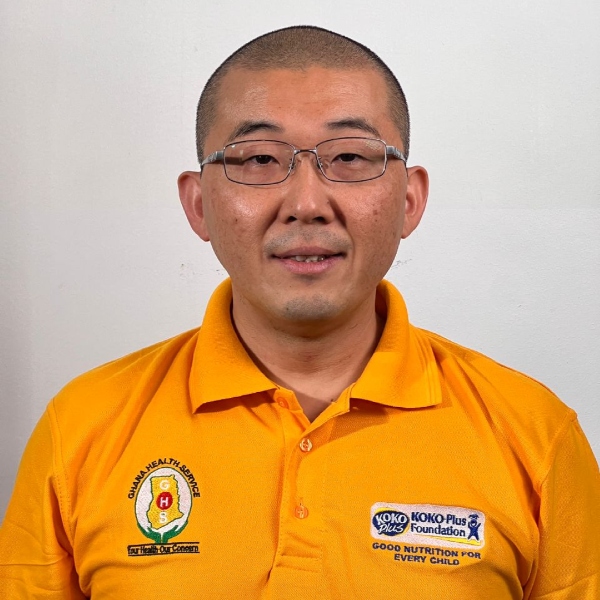
Country Director
Member Bio

Masashi Honda PhD
Country Director
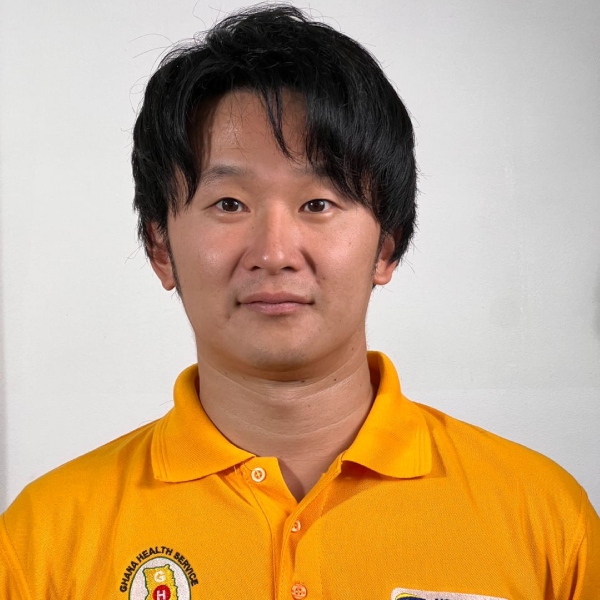
Social Marketing Director
Member Bio

Yusuke Maeyama
Social Marketing Director

Director of Production and Academic Affairs
Member Bio

Dr. Kennedy Bomfeh
Director of Production and Academic Affairs
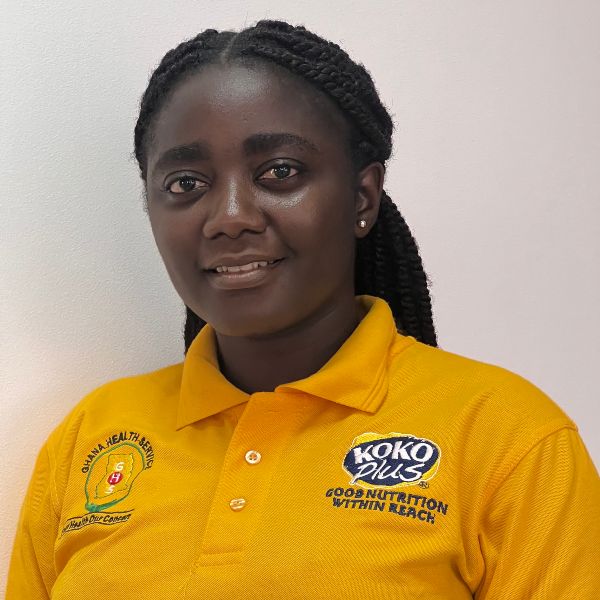
Nutrition and Research Specialist
Member Bio

Priscilla Adei Ashie-Nikoi
Nutrition and Research Specialist

Managing Director
Member Bio

Abdul-Aziz Amankwa
Managing Director

Client Service Director
Member Bio

Samuel Normanyo
Client Service Director

Community Manager
Member Bio

Marilyn Kesewa Nhyira Boateng
Community Manager

Social Marketing Manager (SBCC Specialist)
Member Bio

Ernestina Oforiwaa Duodu
Social Marketing Manager (SBCC Specialist)

Finance & Administative Manager
Member Bio

Samuel Tei-Muno
Finance & Administative Manager

Regional Sales Manager - Greater Accra Region
Member Bio

Frank Ahiabor
Regional Sales Manager - Greater Accra Region

Regional Sales Manager - Ashanti Region
Member Bio

Assani S. M. Tampuri
Regional Sales Manager - Ashanti Region

Sales Coordinator
Member Bio

Manfred Baidoo
Sales Coordinator

Sales Rounder
Member Bio

Justine Vayram Kpedor
Sales Rounder

Health Services Coordinator
Member Bio

Mirian Senam Emma Togoh
Health Services Coordinator

Health Services Assistant
Member Bio

Felix Nyame
Health Services Assistant

Project Coordinator
Member Bio

Franklina Akanglah
Project Coordinator

Health Services Coordinator
Member Bio

Belinda Mensah
Health Services Coordinator

Territory Sales Coordinator
Member Bio

Prince Atta Boakye
Territory Sales Coordinator

Sales Rounder
Member Bio

Isaac N. Appiah
Sales Rounder

Sales Rounder
Member Bio

Awudu Ali
Sales Rounder

Sales Support
Member Bio

Joseph Derry
Sales Support

Territory Sales Coordinator
Member Bio

Sylvester Bukari
Territory Sales Coordinator

Health Services Coordinator
Member Bio

Millicent Sumbo Basinnaah
Health Services Coordinator

Sales Support
Member Bio

Enoch Owusu
Sales Support
Our Partners
Government (Public Institution)









Business Sector






Academia (evidence)






Civil Society (NPO/NGO)







Our Partners - Ghana Health Service
Our Partners - Production
Our Story with the Yedent Agro Group
Our Partners - Production
Our Story with the Yedent Agro Group
MESSAGES OF SUPPORT

Takeshi Sakurai
Professor, Graduate School of Agricultural and Life Sciences
The University of Tokyo
Takeshi Sakurai
We are dedicated to studying how the activities of the activities of private companies in pursuit of profit can improve the nutrition of infants and young children through the market. From this perspective, I have been involved in the monitoring and evaluation analysis of the activities of the Ghana Nutrition Improvement Project since 2015. In collaboration with many organizations, including the government of Ghana, we are conducting field experiments such...
Read More
Ms. Esi Foriwaa Amoaful
Former Deputy Director in charge of Nutrition
Ghana Health Service
Ms. Esi Foriwaa Amoaful
It gives me great pleasure indeed to write in support of the work of the KOKO Plus Foundation. The Ghana Health Service(GHS) has been partnering with The KOKO Plus Foundation since September 2018 following the signing of a Memorandum of Cooperation between the Ghana Health Service and The KOKO Plus Foundation to work together to contribute to addressing the persistently high rate of stunting and other forms of undernutrition in...
Read MoreMESSAGES OF SUPPORT

Patrick Kuma Aboagye
Ghana has a robust and budding health delivery system with increasingly high accessibility and coverage of essential health services contributing to significant health gains in the form of overall improvement in maternal and child health indictors in particular and safeguarding the health of the general populace. Despite the general improvement in Ghana’s wealth and development and the gains made in the health and nutrition outcomes in recent years, there still...

Takeshi Sakurai
We are dedicated to studying how the activities of the activities of private companies in pursuit of profit can improve the nutrition of infants and young children through the market. From this perspective, I have been involved in the monitoring and evaluation analysis of the activities of the Ghana Nutrition Improvement Project since 2015. In collaboration with many organizations, including the government of Ghana, we are conducting field experiments such...

Ms. Esi Foriwaa Amoaful
It gives me great pleasure indeed to write in support of the work of the KOKO Plus Foundation. The Ghana Health Service (GHS) has been partnering with The KOKO Plus Foundation since September 2018 following the signing of a Memorandum of Cooperation between the Ghana Health Service and The KOKO Plus Foundation to work together to contribute to addressing the persistently high rate of stunting and other forms of under nutrition in...
Our Innovative Projects
What is the African Health and Wellbeing Initiative (AfHWIN)
The African Health and Wellbeing Initiative (AfHWIN) is a public-private partnership led by the Japanese government, aimed at improving maternal and child health and nutrition in Africa. By leveraging Japan’s advanced technology, the initiative strengthens sustainable health and nutrition support. As part of this effort, the KOKO Plus Foundation’s “KOKO Plus®” contributes to preventing malnutrition and anemia, supporting the healthy growth of children in Africa. Furthermore, it fosters collaboration between government, academia, industry, and civil society to establish a strong foundation for global health in Ghana.
AfHWIN provides tailored support based on local needs and works in partnership with Japanese companies and international organizations to deliver comprehensive health and nutrition packages, contributing to a sustainable future.
The Ajinomoto Foundation (KOKO Plus Foundation), Sysmex, and NEC Launch Project to Improve Maternal and Child Health in Ghana
The Ajinomoto Foundation (KOKO Plus Foundation), Sysmex, and NEC have partnered to enhance maternal and child health in Ghana. This collaboration leverages Sysmex’s diagnostic technology, NEC’s ICT solutions, and the Ajinomoto Foundation’s nutrition supplements like KOKO Plus®. The project focuses on improving healthcare services, including anemia diagnosis and nutrition education, contributing to universal “nutrition” health coverage in the country.
Universal Nutrition and Health Coverage Through Sustainable Systems for Nutrition Improvement
Universal Nutrition and Health Coverage Through Sustainable Systems for Nutrition Improvement
Food Assistance
WFP will provide value vouchers, including KOKO Plus®, to improve nutrition in Karaga. Livelihood support and SBCC (Social Behavior Change and Communication) through VSLAs(Village Saving Loan Associations) and support groups will empower beneficiaries to buy nutritious food and improve health outcomes.
SBCC and Market-Based Approach
TAF will lead efforts to promote healthy eating by increasing access to nutritious foods like KOKO Plus® in urban areas, encouraging sustainable nutrition improvements through SBCC in collaboration with Ghana Health Service(GHS) around 35% districts in whole of Ghana.
African Health and Wellbeing Initiative (AfHWIN) Pilot project
In partnership with GHS, NEC (an ICT service provider), and Sysmex (a medical equipment manufacturer), and KOKO Plus Foundation LBG・The AJINOMOTO FOUNDATION (TAF) the project will introduce IT training, diagnostic tools, and KOKO Plus® to prevent malnutrition, focusing on early detection of key health issues.
Publications
- Improving complementary feeding in Ghana: reaching the vulnerable through innovative business – the case of KOKO Plus (2014)
- Optimization of the nutrient content and protein quality of cereal–legume blends for use as complementary foods in Ghana (2014)
- Role of Protein and Amino Acids in Infant and Young Child Nutrition: Considerations for the Development and Delivery of High Quality Complementary Food Supplements (2015)
- Effect of a macro and micronutrient fortified complementary food supplement (KOKO Plus) on linear growth of children 18 months of age in Ghana (2016)
- A macro- and micro-nutrient fortified complementary food supplement reduced acute infection, improved hemoglobin and showed a dose response effect in improving linear growth: a 12 month cluster randomized trial (2019)
- Development and Sensory Shelf-Life Testing of KOKO Plus: A Food Supplement for Improving the Nutritional Profiles of Traditional Complementary Foods (2019)
- Effect of lysine supplementation on health and morbidity in subjects belonging to poor peri-urban households in Accra, Ghana (2010)
- Fostering reflective trust between mothers and community health nurses to improve the effectiveness of health and nutrition efforts: An ethnographic study in Ghana, West Africa (2016)
- Effect of the provision of a macro- and micro-nutrient fortified complementary food supplement on nutritional status of Ghanaian infants (2017)
- Changes of Plasma Amino Acid Profiles in Infants With a Nutrient-Fortified Complementary Food Supplement: Evidence From a 12-Month Single-Blind Cluster-Randomized Controlled Trial (2021)
- Assessing Program Coverage of Two Approaches to Distributing a Complementary Feeding Supplement to Infants and Young Children in Ghana (2016)
- Satoru Okonogi, Takeshi Sakurai, and Reginald Adjetey Annan (2020) Improving Infant Nutrition through the Market: Experimental Evidence in Ghana, Working Paper No. 20-F-01, Department of Agricultural and Resource Economics, The University of Tokyo.(2020)
- Okonogi, S., Annan, R. A., & Sakurai, T. (2024). Improving Infant Nutrition Through the Market: Experimental Evidence from Ghana.
- Benhayoune, S., and Y. Toride (2022) “Ghana Nutrition Improvement Project: Co-designing a P.ACT to Tackle Infant Malnutrition.”
MAKE AN ENQUIRY
We would love to answer any questions you may have. Leave us a message!


